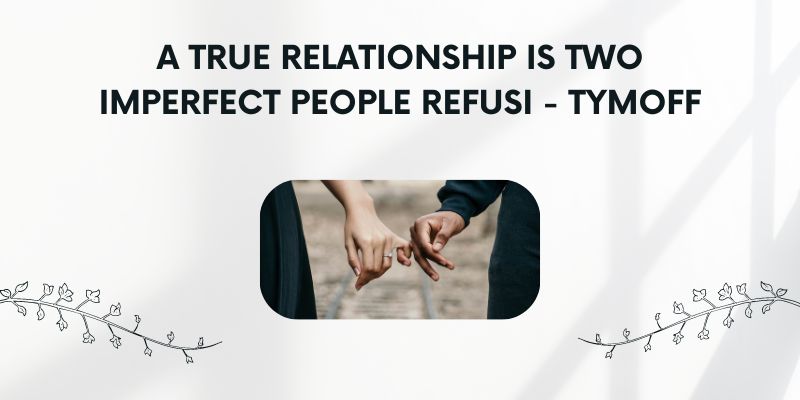A True Relationship is Two Imperfect People Refusi – Tymoff
Making a connection between two people is important for their emotional, social, and psychological health. Relationships provide psychological support and understanding. Having someone to share good and sad occasions with can raise your emotional strength, reduce stress, and improve your mental health. Meaningful relationships and belonging help humans thrive. Positive relationships often boost happiness. A richer life comes from building relationships, remembering, and cherishing loved ones.
As perfection is glorified and sought after, the idea of a meaningful partnership between two imperfect people who refuse to give up has gained popularity. A True Relationship is two imperfect people Refusi – Tymoff captures the spirit of embracing imperfections and overcoming relationship obstacles. This perspective challenges the idea that a successful and lasting relationship requires perfection. Instead, it praises imperfection and the power that comes from two people navigating life together.
Relationships can foster personal growth. Supportive connections help people overcome obstacles and handle life’s challenges. Strong relationships promote and maintain mental health. However, feeling isolated can cause depression and anxiety.
We need to acknowledge that good connections can support and complete us. Positive, supportive relationships lead to better outcomes, whereas dysfunctional ones might affect one’s well-being. Establishing and maintaining successful relationships requires attention, communication, and respect.
Dynamics of a real relationship and respecting each other’s flaws
A strong and resilient relationship is marked by a range of dynamics that contribute to its authenticity and stability. Recognizing and embracing one another’s flaws is essential for building a profound and significant bond. Here are some factors that emphasize the dynamics of a genuine relationship and the importance of embracing flaws
Affection without conditions
A sincere relationship is established through affection, without any conditions or expectations. It entails embracing someone unconditionally, accepting their imperfections and all, without placing unrealistic expectations on them.
Clear communication
Strong communication is crucial in every professional relationship. It requires not just sharing one’s thoughts and emotions, but also actively paying attention to the other individual. Clear and transparent communication is crucial for fostering understanding and embracing one another’s flaws.
Being open and trustworthy
True partnerships require vulnerability and trust. Opening up about one’s weaknesses and insecurities deepens the relationship, but one must trust the other person to accept them without judgment.
Understanding each other
Putting oneself in the other person’s shoes, understanding their perspective, and accepting their flaws with compassion is empathy. Be kind and supportive, even when things get tough.
Valuing individuality
Every person in a relationship possesses their own distinct qualities and areas for growth. Valuing imperfections involves showing respect and gratitude for the unique qualities that distinguish each individual.
Evolving together
A genuine connection fosters individual progress and improvement. Embracing imperfections requires acknowledging that both individuals are constantly growing and changing. Collaborating and developing together can enhance the connection.
Forgiveness
Mistakes and weaknesses require forgiveness. A good relationship requires forgiveness, believing that everyone makes mistakes and that moving ahead without bitterness is necessary.
Celebrating strengths
While mistakes are acknowledged, it’s crucial to celebrate each other’s talents and excellent attributes. Positive environments are created by helpful partners that recognize personal progress and success.
Collaboration and cooperation
A genuine connection functions as a collaborative effort where both individuals work together as a team. Embracing imperfections involves acknowledging that no one is flawless, and it is the collective dedication and encouragement that fortify the relationship.
Long-term commitment
In true relationships, long-term commitment is common. Accepting faults helps maintain the connection since it recognizes that struggles are part of life. A real connection respects the whole person, not just their surface traits. It’s all about embracing flaws, fostering development, and establishing a bond rooted in affection, reliability, and shared comprehension. This acceptance not only enhances the bond but also adds to the overall satisfaction and joy of both parties.
Meaning of the phrase“A True Relationship Is Two Imperfect People Refusi – Tymoff”?
Acceptance of faults is key to true, lasting partnerships. Everyone is imperfect. In a true partnership, tolerating each other’s imperfections builds honesty as well as individual progress. It encourages partners to be themselves without criticism.
Understanding is the foundation of a true relationship consisting of two imperfect people. Each person’s variances, errors, and vulnerabilities must be accepted. Tolerance for both partners encourages stability and openness in the partnership.

Any partnership will have challenges, but perseverance is key. By enduring, learning from their mistakes, and strengthening their relationship, two imperfect individuals show adaptability. Real relationships require open dialogue. It boosts communication and understanding by letting partners share their sentiments. Talking helps resolve disagreements and improve relationships.
Accepting Imperfections in a Comparative Society
In a comparison-driven society, accepting faults is a revolutionary act of self-love. The constant assault of curated images on social media, societal expectations, and pressure to conform can make people feel the need to reach unreasonable standards. Accepting faults is a potent antidote to the destructive culture of comparison.
Self-acceptance helps people overcome perfectionism in the face of external demands. Imperfections enrich the human experience, not detract from it. In a world that prioritizes appearance above substance, admitting our shortcomings allows for authenticity and true connections. Accepting faults promotes social empathy and compassion. As people admit their weaknesses, others follow suit.
This acceptance creates a more compassionate and understanding community where everyone feels noticed and respected. In a comparison-driven society, accepting flaws is a revolutionary act of self-worth. It rejects the assumption that self-worth depends on external norms and supports the idea that true beauty comes from individuality.
Final words
In conclusion, embracing faults in a comparison-driven world is transforming and liberating. It declares that our worth is not based on society or false expectations. In this scenario, a true relationship is two imperfect people refusi-tymoff ideology becomes an effective therapy. This approach promotes partner growth, open communication, resilience, and unconditional love. Accepting faults as individuals and as a society leads to a more compassionate, real, and inclusive world that celebrates the richness of the human experience in all its delightfully flawed splendor.




